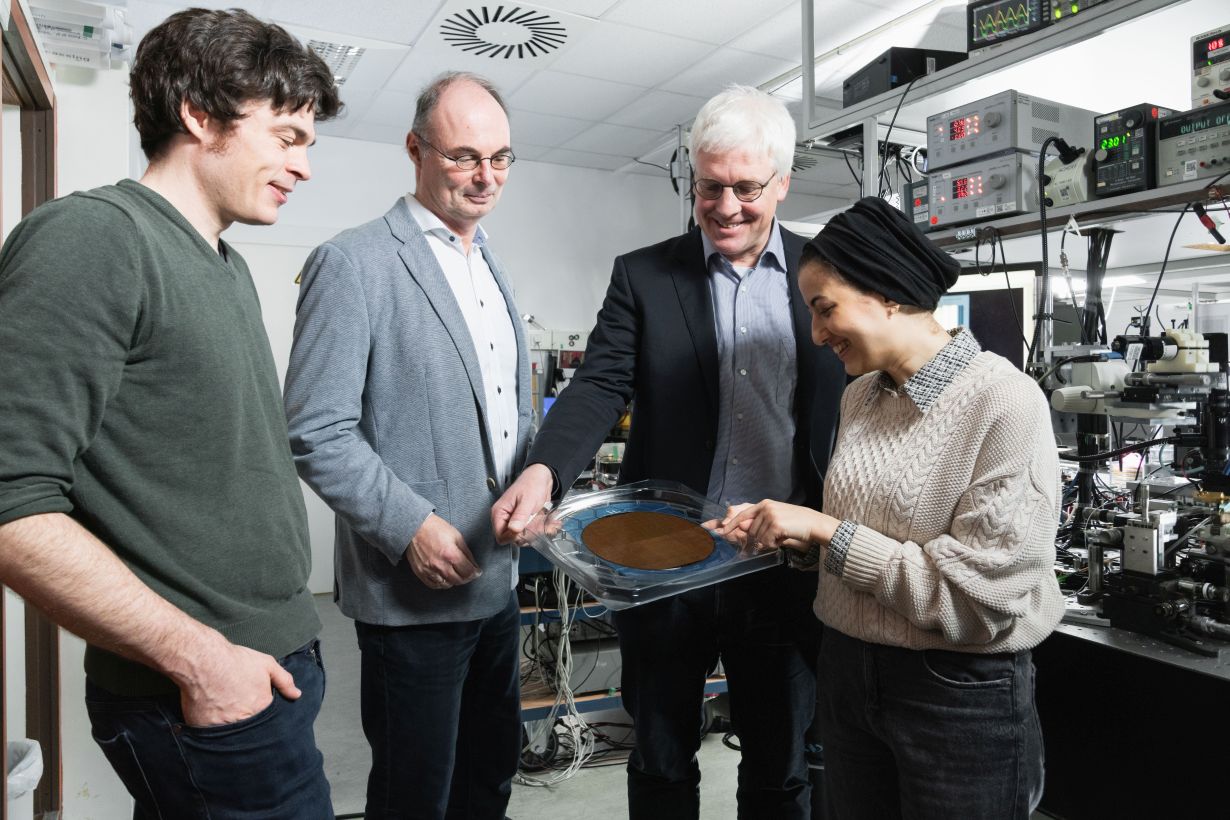The European Research Council (ERC) is funding the ATHENS research project headed by professors Christian Koos and Stefan Bräse of the Karlsruhe Institute of Technology (KIT) with a Synergy Grant. The project’s objective is to improve the performance and energy efficiency of optical communications systems. Given growing demand for the transmission of large volumes of data by artificial intelligence (AI) applications, such improvements are especially relevant. The ERC is funding ATHENS for six years with EUR 14 million. One location where work on the project will be performed is the Karlsruhe Center for Optics and Photonics (KCOP), which is set to open in 2025.
Enormous growth in data volumes is a challenge for information and communications technology. In particular, training so-called large language models for AI applications is a mammoth computing task that faces a bottleneck in the communication among thousands of processors in huge parallel computing systems. Optical transceivers play a key role in this process by converting electrical information into optical signals that are then transmitted quickly and efficiently via a glass fiber or a waveguide. Silicon components have generally been used for signal conversion in the transceivers, but this solution is reaching its limits as pure silicon components are too slow for the ever-increasing amounts of data. In addition, existing transceivers consume considerable amounts of energy, resulting in high CO2 emissions for the AI models.
Better Data Transmission with Lower Energy Consumption
The ATHENS project investigates new material systems and components for electronic-to-optical signal conversion. “Our goal is to make transceivers not only more powerful but also more efficient so that higher data transmission rates can be reached with the same or even lower energy consumption,” said Professor Christian Koos from the Institute of Photonics and Quantum Electronics and the Institute of Microstructure Technology at KIT. “With the funding from the ERC Synergy Grant, we can now carry out the entire ATHENS project, from the selection of suitable materials to the simulation of organic molecules and a working transmission system in the lab.”
Combining Silicon with Other Materials
The four-member team, which in addition to Koos includes Professor Stefan Bräse from the Institute of Organic Chemistry and the Institute for Biological and Chemical Systems at KIT, Professor Carsten Ronning from Friedrich Schiller University Jena and Professor Tobias Kippenberg from the Swiss Federal Institute of Technology in Lausanne, is taking a hybrid approach by combining silicon with other materials. “Silicon components are inexpensive and available in large quantities, but there are limits to their optical capabilities. To compensate for these limitations while continuing to enjoy the benefits of silicon, we combine silicon with other material systems,” Koos said. One approach being tested by the team is the use of organic materials, i.e. carbon-based compounds. “We can simulate these molecules on computers before producing materials with the characteristics we want in the lab and then printing them on silicon wafers,” Bräse said. Another method involves combining silicon photonic chips with other chips to form additional material platforms, for example crystal-on-insulator platforms in which a thin monocrystalline layer is placed on an insulating substrate for later processing into optical components.
Funding Enhances KIT’s Standing in Photonics
“Rapid advances in artificial intelligence are a major challenge for the information technology sector. Viable solutions need to be found quickly,” said Professor Oliver Kraft, Vice President for Research at KIT. “I’m pleased that with ATHENS, the European Research Council is funding a project at the interface between materials science and information technology. This research enhances KIT’s outstanding position in photonics, which is set to grow further as the Karlsruhe Center for Optics and Photonics (KCOP) is completed."
Benefits for Quantum Technology and Medical Engineering
Beyond AI models, hybrid material systems for transceivers could also have uses in quantum technologies and medical engineering, for example in sensors for wearable devices or in optical lab-on-a-chip applications for analyzing blood samples.
ERC Synergy Grant
With its Synergy Grants, the European Research Council funds promising research teams. The grants are intended for projects that are only possible through collaboration among the designated scientists and will lead to discoveries at the interfaces between established disciplines and to significant advances at the frontiers of knowledge. In 2024, 548 grant applications were submitted. The ERC selected 57 projects for Synergy Grants. Germany is involved in 34 of the selected projects, by far the highest share. This is the fourth time that a prestigious ERC Synergy Grant has gone to KIT researchers.
Being “The Research University in the Helmholtz Association”, KIT creates and imparts knowledge for the society and the environment. It is the objective to make significant contributions to the global challenges in the fields of energy, mobility, and information. For this, about 10,000 employees cooperate in a broad range of disciplines in natural sciences, engineering sciences, economics, and the humanities and social sciences. KIT prepares its 22,800 students for responsible tasks in society, industry, and science by offering research-based study programs. Innovation efforts at KIT build a bridge between important scientific findings and their application for the benefit of society, economic prosperity, and the preservation of our natural basis of life. KIT is one of the German universities of excellence.

